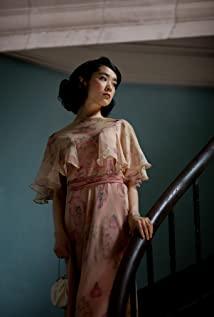The narration of Watanabe at the beginning of the film Muyue and Naoko
emphasizes that the two are childhood sweethearts. The two also think so, but Naoko's physical refusal tells us that their relationship is not actually a lover, but more like a brother and sister, but For the more traditional duo, this is an unacceptable fact. Even though they don't really love each other, they have nothing but each other and they can't accept anyone else. Muyue realized that she could not give Naoko happiness and committed suicide. Naoko knew that she loved Watanabe, but her inner tradition did not allow her to betray her like this. She could not admit the fact that she did not love Muyue, and she eventually committed suicide. .
Naoko and Watanabe
On the night of Naoko's birthday, Naoko was so wet, maybe men didn't believe it, but when a woman doesn't physically reject that man, although she can't arbitrarily say that she loves this man, at least she has feelings for this man. Naoko loves Watanabe, as mentioned above, but she can't accept the fact that she thinks that she should love Kiyue, so the shadow of Kiyue always follows her, so when she realizes that she is When he loved Watanabe, his body resisted intentionally, as if it was a betrayal, just like she betrayed Muyue. Does Watanabe love Naoko? This is a complicated question. If he loves, then he shouldn't be attracted to Midori. If he doesn't, why was Naoko so sad when he committed suicide? The feelings for Naoko are complicated in my opinion, there are brother and sister love, childhood fantasies, responsibility for Muyue, and of course, love. Watanabe wanted to love Naoko, but the closer they got, the more he felt the shadow of Kiyue, he always felt that he was loving Naoko instead of Kiyue, because Kiyue was his best friend, just like Kiyue His death is a kind of request, please ask Watanabe to love Naoko instead of Kiyuki. This series of complex emotions exhausted him. The traditional concept of love and the modern concept of free love collided in him. Naoko saw this kind of collision. I think Naoko, who longs for freedom in his heart, chose suicide to fulfill Watanabe. If she doesn't die, Watanabe may never get out of the conservative tradition. It may be like this.
Watanabe and Midori are
both in their prime and have received higher education. The girl took the initiative to express her intentions and was bold and active. Watanabe seemed to be caught off guard, and Watanabe, who thought he was in love with Naoko, didn't realize his love for Midori. Both the other half are trying their best to control. In my opinion, this kind of control is not the avoidance of love, but the respect for love. In the bar, Watanabe's answer stings Midori, Watanabe is about to lose Midori, he keeps calling, and he realizes that he loves Midori. Later, Midori also broke up with her boyfriend and decided to wait for Watanabe wholeheartedly, to love Watanabe wholeheartedly, and to love without betrayal both physically and mentally. The love between them is easy and natural, they can imagine having a bunch of children in Paraguay (or Uruguay?), but with Naoko, Watanabe has never been so relaxed. Heavy love, I think no one can afford it after all.
Watanabe and Reiko
I don't know why, the first time they met in the movie made me feel very ambiguous. I had some expectations about their sex in the end. I think for Reiko, Reiko is a traditional woman like Naoko, although there is no explanation in the movie, But I think she also realized that she didn't love her husband, but because of tradition, she felt that she couldn't love anyone other than her husband, so she was admitted to the nursing home. Her sex with Watanabe is, I think, a ritual for her to break this bondage. So for Watanabe, I think it's the final farewell to Naoko.
Yongze and
Hatsumi Yongze kept changing their implantation partners. Although Hatsumi knew it, she stayed by Yongze's side without hesitation. The two who seemed to be the strongest were actually the most cowardly representatives of love. Yongze wants to go abroad. Judging from the conversation between him and Watanabe, although he has a nonchalant attitude, his tone and eyes reveal fear. He is afraid of losing Hatsumi, but on the other hand, he does not have the courage to take on love. Responsibility. As for Chumei, looking at the performance in the film, Chumei should be a young lady from a big family. She came from a wealthy family or a noble family. She didn't have the courage to fight against the family and chose Yongze. In addition, I think Yongze has some shadow of her father in her body. I'm afraid she can't bear the submissive life like her mother, she can't change anything, she has no right to make any choice, the only thing she can be sure of is that she loves Yongze, and after two years of marriage, she still committed suicide after all. It is another love feature with a tragic ending, which is mixed with the background of too many times.
Costume, soundtrack and tone
are typical of the 1960s and 1970s, simple and well-fitting, thanks to the fact that the actors are all skinny, they look really good to wear, and the music has a typical hippie style, plus one or two long-haired uncles. Cameo, the characteristics of the times cannot be said to be vivid, but at least the taste is strong enough.
The film has two tones, the dim yellow tone is warm and retro, while the gray-blue tone in other parts can also well set off the depression and gloom of the characters.
People in that era were struggling to reflect and suffer for free love. But the people of this age are suffering from material things and carnal desires. Is this the progress of the times? What a great irony.
View more about Norwegian Wood reviews











